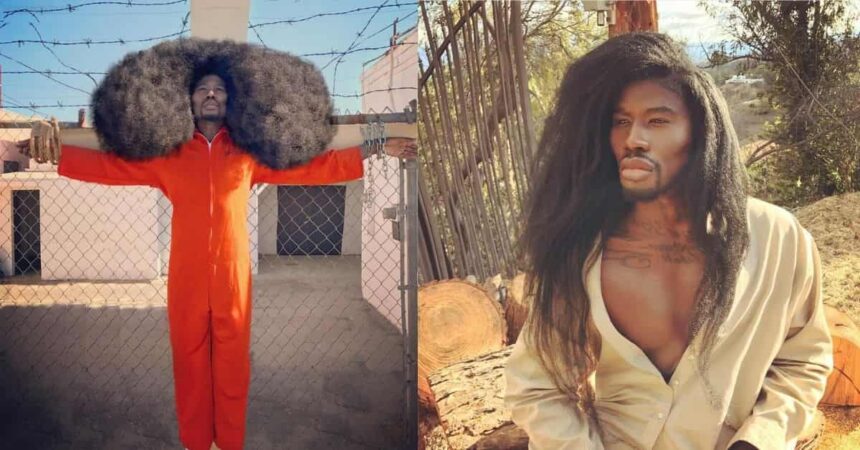The natural hair community was shaken when allegations surfaced against Benny Harlem, the viral Instagram sensation known for his extraordinarily long afro. What started as an inspiring father-daughter hair journey quickly turned into one of social media’s most controversial influencer fraud cases, leaving thousands of followers questioning everything they believed about natural hair growth.
Overview of the Benny Harlem Controversy
Benny Harlem rose to internet fame alongside his alleged daughter Jaxyn through stunning Instagram photos showcasing their incredibly voluminous, floor-length natural hair. The duo positioned themselves as advocates for African consciousness and natural hair care, amassing hundreds of thousands of followers who were captivated by their seemingly impossible hair growth achievements.
However, the fairy tale came crashing down when eagle-eyed social media users began noticing inconsistencies. Digital forensics experts and everyday users alike started identifying clear signs of photo manipulation, with hair textures showing unnatural repetition patterns typical of Photoshop cloning tools. More damaging still were revelations that the “family” narrative was entirely fabricated – the woman and child presented as his wife and daughter were allegedly not related to him at all.
The controversy deepened when former associates came forward with claims that Benny had orchestrated an elaborate deception to build his brand. Videos showed his actual hair length to be significantly shorter than the viral photos suggested, and his claimed natural growth methods of “juices and berries” were exposed as marketing fiction designed to sell expensive hair products.
How the Alleged Scam Worked
The Benny Harlem operation followed a sophisticated multi-layered approach that many experts now consider a blueprint for modern influencer fraud:
Visual Deception
- Photo Manipulation: Extensive use of Photoshop to create unnaturally long and voluminous hair
- Strategic Photography: Carefully staged photos that concealed the true length and texture
- Selective Content: Limiting video content where digital manipulation would be more obvious
Narrative Construction
- Fake Family Story: Creating an emotional father-daughter journey that viewers could connect with
- Cultural Positioning: Leveraging African consciousness and natural hair movements for authenticity
- Progress Documentation: Fabricating a timeline of “natural” hair growth over months and years
Product Integration
- Organic Marketing: Building trust through the personal story before introducing products
- Secret Formula Claims: Promoting mysterious natural ingredients and ancestral knowledge
- Social Proof Manufacturing: Encouraging followers to share their own “results” and testimonials
Business Opportunity: The Hair Care Gold Rush
Benny Harlem’s success highlighted the massive financial potential within the Black hair care market, estimated at over $2.5 billion annually. His business model capitalized on several key factors:
Market Vulnerabilities:
- Deep-seated insecurities about natural hair texture and length
- Limited representation of extremely long natural hair in mainstream media
- Historical trauma around Black hair acceptance and beauty standards
- Desperate desire for “miracle” solutions and quick fixes
Revenue Streams:
- Premium hair care product lines with markups of 300-500%
- Sponsored content and brand partnerships
- Speaking engagements and workshop appearances
- Merchandise and branded accessories
The controversy revealed how easily authentic community movements could be exploited for profit, with genuine hair care education being overshadowed by sensationalized marketing tactics.
User Reviews, Opinions and Complaints
Negative Feedback
Product Performance Issues:
- No Results: Customers reported zero improvement after months of use
- Overpricing: Products priced 3-4 times higher than comparable alternatives
- Poor Quality: Cheap ingredients despite premium pricing
- False Advertising: Results nothing like the promotional materials suggested
Customer Service Problems:
- Difficult refund processes
- Unresponsive support teams
- Ignored complaint emails
- Blocked social media accounts after negative reviews
Defender Testimonials
Despite overwhelming evidence, some supporters maintained their belief:
- Award Recognition: Pointing to magazine features and industry awards
- Personal Results: Claiming positive experiences with products
- Harassment Claims: Arguing critics were motivated by jealousy
- Incomplete Evidence: Questioning the definitive nature of fraud allegations
Expert Analysis
Hair care professionals and dermatologists consistently disputed Benny’s claims:
- Genetic Limitations: Hair growth rates are primarily determined by genetics, not products
- Impossible Timeline: The documented growth exceeded known biological capabilities
- Ingredient Analysis: Product formulations contained nothing revolutionary or unique
Red Flags: Warning Signs of Influencer Scams
The Benny Harlem case revealed several critical warning signs that consumers should watch for:
Visual Red Flags
| Warning Sign | What to Look For |
|---|---|
| Inconsistent Appearance | Hair looks different in videos vs. photos |
| Perfect Repetition | Unnatural texture patterns suggesting digital cloning |
| Lighting Discrepancies | Shadows and highlights that don’t match the environment |
| Edge Quality | Fuzzy or unnatural hairlines where editing occurred |
Behavioral Red Flags
- Limited Video Content: Avoiding live streams or unedited footage
- Defensive Responses: Aggressively attacking critics instead of addressing concerns
- Vague Explanations: Refusing to provide specific product ingredients or methods
- Family Exploitation: Using children or fake relationships for emotional manipulation
Marketing Red Flags
- Miracle Claims: Promising impossible results in unrealistic timeframes
- Secret Formulas: Refusing to disclose ingredients or scientific backing
- Pressure Tactics: Limited-time offers and artificial scarcity
- Testimonial Manipulation: Only showing cherry-picked positive reviews
How to Identify and Protect Yourself from Influencer Scams
Research and Verification
- Cross-Reference Sources: Check multiple platforms for consistency
- Reverse Image Search: Verify photos haven’t been stolen or manipulated
- Scientific Validation: Research claimed ingredients and their actual effects
- Third-Party Reviews: Look for unbiased reviews outside the influencer’s control
Critical Evaluation
- Question Perfect Results: Be skeptical of dramatic before/after transformations
- Analyze Video Content: Pay attention to lighting, angles, and editing
- Check Professional Credentials: Verify any claimed expertise or certifications
- Monitor Response Patterns: Notice how they handle criticism and negative feedback
Financial Protection
- Start Small: Never invest large amounts in unproven products
- Use Protected Payment Methods: Credit cards offer better fraud protection than debit
- Document Everything: Save screenshots of claims and advertisements
- Know Your Rights: Understand return policies and consumer protection laws
What to Do If You’ve Been Scammed
Immediate Actions
- Document Evidence: Screenshot all communications and advertisements
- Contact Your Bank: Report fraudulent charges and request chargebacks
- File Complaints: Report to the FTC, Better Business Bureau, and relevant authorities
- Warn Others: Share your experience on review platforms and social media
Legal Considerations
- Class Action Opportunities: Join with other victims for stronger legal action
- Consumer Protection Agencies: Utilize government resources for assistance
- Professional Legal Advice: Consult attorneys specializing in consumer fraud
Frequently Asked Questions (FAQs)
1. Is Benny Harlem a Scammer?
Based on extensive evidence including photo analysis, inconsistent video appearances, and fabricated family relationships, multiple sources have concluded that Benny Harlem engaged in deceptive marketing practices. However, some supporters continue to defend him despite the allegations.
2. Are His Hair Products Effective?
Independent reviews and customer testimonials predominantly report no significant results from Benny Harlem’s hair products. Hair care professionals note that the ingredients offer nothing beyond standard commercial formulations, despite premium pricing.
3. How Much Money Did He Make?
While exact figures remain undisclosed, industry estimates suggest Benny Harlem’s operation generated millions in revenue through product sales, sponsorships, and appearances before the controversy emerged.
4. What Happened to His Social Media Accounts?
Following the exposure, Benny Harlem’s social media presence significantly diminished. Many accounts were either deleted or went inactive, though some affiliated profiles may still exist.
5. How Can I Get a Refund?
Customers seeking refunds should contact their credit card companies for chargebacks, file complaints with consumer protection agencies, and document all attempts to resolve the issue directly with the company.
Conclusion
The Benny Harlem controversy serves as a watershed moment for influencer accountability and consumer protection in the digital age. What began as an inspiring story of natural hair celebration ultimately revealed the sophisticated methods that fraudulent influencers employ to exploit vulnerable communities.
This case highlights the critical importance of digital literacy, scientific skepticism, and consumer awareness in our social media-driven marketplace. The natural hair community’s ability to identify and expose this deception demonstrates the power of collective vigilance in protecting against influencer fraud.
As consumers, we must remain vigilant against too-good-to-be-true claims while supporting authentic creators who genuinely serve their communities. The Benny Harlem scandal reminds us that extraordinary claims require extraordinary evidence – and that our wallets and well-being depend on our ability to distinguish between inspiration and exploitation.
Stay informed about the latest consumer protection news and influencer scam alerts with ShoppersVila.com – your trusted source for smart shopping decisions and marketplace safety.





























